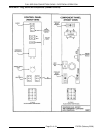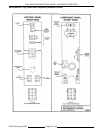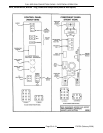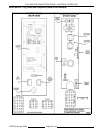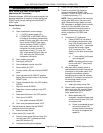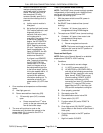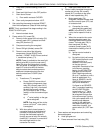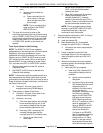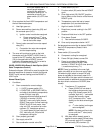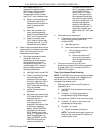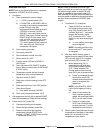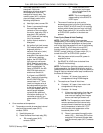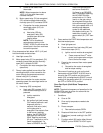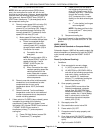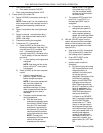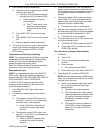
FULL SIZE GAS CONVECTION OVENS - ELECTRICAL OPERATION
F32700 (February 2006)Page 39 of 64
trial cycle repeats after a 15
second purge between
cycles for two additional
tries before locking out. To
reset after a lockout, turn
power switch (S1) OFF then
ON.
5. Oven reaches the fixed HOLD temperature and
the hold thermostat opens.
A. Heat light goes out.
B. Power removed from heat relay (R3) and
the contacts open (N.O.).
1) Ignition control module de-energized.
a. Power removed from 2
nd
valve
(main) on the gas valve and gas
flow to the burner stops.
C. Power is also removed from motor speed
relay (R1).
1) Convection fan motor de-energized
and fan stops rotating.
6. The oven will continue to cycle on the hold
thermostat until the ROAST & HOLD timer is
turned to the OFF position, the function switch
(S3) is changed back to ROAST (normal
cooking) or the power switch (S1) is turned to
the OFF or OVEN COOL position.
WKGD, WKGDX With Roast & Hold Option (Solid
State Temperature Control)
Schematic diagram 10834 will be used to explain the
electrical sequence of operation for both the Normal
ROAST cycle (normal cooking) and the ROAST &
HOLD cycle.
Normal Roast Cycle
1. Conditions.
A. Oven connected to correct voltage.
1) L1 (HOT) to power switch (S1).
2) L2 (NEUTRAL or SECOND LINE) to
one side of the following components:
power ON light, heat light,
temperature control board terminal 9
(120VAC) or terminal 10 (208-
240VAC), oven cavity lights, buzzer,
ROAST timer motor (normal cooking),
ROAST & HOLD timer motor, heat
relay coil (R3), convection fan motor
common (C), transformer primary
(T1), motor speed (Hi/Low) relay coil
(R1), hold relay coil (R2) and the
component cooling fan.
B. Oven properly grounded.
C. Gas supply valve ON.
D. Gas combination control valve ON.
E. Power switch (S1) OFF.
F. Function switch (S3) set to Normal ROAST
cycle.
G. Oven light switch (S2) ON/OFF (position
has no affect on the function of the Normal
ROAST cycle).
H. Temperature control dial set to lowest
temperature (fully counterclockwise).
I. High limit switch CLOSED.
J. Roast timer (normal cooking) in the OFF
position.
K. Roast and Hold timer in the OFF position.
L. Oven doors Closed.
1) Door switch contacts CLOSED.
M. Oven cavity temperature below 140°F.
2. Set temperature control dial to desired ROAST
then HOLD temperature (Roast & Hold
cooking).
3. Power switch (S1) turned ON.
A. Component cooling fan energized.
B. Power ON light (Amber) comes ON.
C. Power to one side of the following
components: Normal ROAST timer
terminal 1, ROAST & HOLD timer terminal
1, transformer primary (T1).
NOTE: Power is available to the oven light
switch (wire #20) to turn the oven cavity lights
ON when the light switch is turned ON; and
power is available to the normally open N.O.
side (wire #28) of the door switch contacts and
connects power to additional components when
the door switch contacts are CLOSED (door
closed).
1) Transformer (T1) energized.
a. Power (24VAC) to one side of
the following components: heat
relay (R3) normally open (N.O.)
contacts, high limit --- connected
through the normally closed
(N.C.) contacts to the 1
st
valve
(safety) on the dual solenoid gas
valve.
a) 1
st
valve (safety) on the gas
valve energized.
NOTE: Gas does not flow to the
burner until the 2
nd
valve (main)
is energized.
2) With door switch closed, power is
applied to motor speed (Hi/Low) relay
(R1) normally open (N.O.) contacts
and hold relay (R2) common (C).



